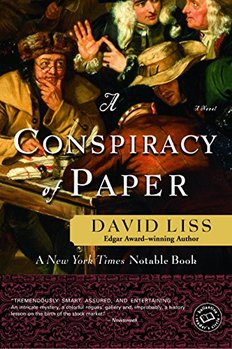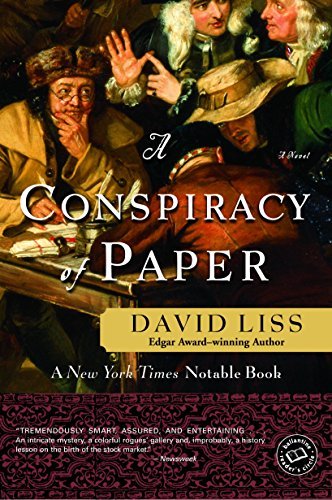
Take a wild ride to early 18th-century England. You’ll meet a famous Jewish boxer, the men behind the South Sea Bubble, and the world’s first modern crime lord. Welcome to David Liss‘ carefully constructed account of A Conspiracy of Paper. The book won the Edgar Award for Best First Novel.
Estimated reading time: 4 minutes
Rampant financial skulduggery: the South Sea Bubble
The opening decades of the 18th century in England were an era of rapid change, like our own time. Although paper money had been invented centuries earlier in China, its use did not become widespread in Europe until after the middle of the 17th century.
The Bank of England issued the first banknotes only in 1695. Within two decades, when A Conspiracy of Paper is set, speculation had begun to swirl around the new paper financial instruments, especially shares in the early joint-stock companies. Most of the “stock-jobbers” (today’s stockbrokers) who peddled these shares were an unscrupulous lot. Fraud was rampant. And nowhere was the speculation wilder than in the shares of the South Sea Company.
The turmoil on the Exchange culminated in 1720 in the world’s first stock market crash. This was the event that came to be known as the South Sea Bubble.
A Conspiracy of Paper (Benjamin Weaver #1) by David Liss (2000) 482 pages ★★★★★
Winner of the Edgar Award for Best First Novel
A crime-ridden city without police
A Conspiracy of Paper is set in 1719, when the population of London was approximately 600,000. (There were only a handful of larger cities in the world, and only in Asia.) Most of the city’s residents lived in squalor. Crime was rampant, murder common. There were no police other than the thugs who roamed the city to grab citizens and haul them off to jail for generous awards, usually for not paying their bills. Anyone who lives today in a modern city would find the sights and smells—especially the smells—of London in that era to be insufferable. And all these conditions enter the picture in abundant detail in this skillfully written historical novel.
A famous Jewish boxer
Ben Weaver was born and raised the son of a wealthy stock-jobber named Samuel Lienzo. The family are what today we know as Sephardic Jews (although the term used then was Iberian). He left home as a teenager, changed his name, and turned to a life as a boxer, becoming known as the Lion of Judah. When injury ended his boxing career, Ben turned to crime. Years later, reformed, he has earned a living as a “thief-taker,” capturing thieves and delivering them to the constables for a reward. But, unlike Jonathan Wild, a competitor who dominates the city, Ben is honest and reliable. However, he is constantly forced to prove himself because of rampant anti-Semitism and the terrible reputation of Jewish stock-jobbers like his father.
A fateful coincidence
Writing thirty-five years after the fact, Ben relates how he was approached by a prosperous gentleman named William Balfour and asked to investigate the death of his father. The elder Balfour was determined to have committed suicide. And, in what is surely no coincidence, Ben’s own father had died not a day earlier when run over in the street by a carriage. Lienzo and Balfour’s father had done business together. The assignment sets Ben off on a fraught investigation that carries him to all corners of the city—and threatens to upend the fortunes of the South Sea Company and the Bank of England.
The first modern crime lord
Although most of the characters in A Conspiracy of Paper are entirely fictitious, both Ben Weaver and Jonathan Wild are based on historical figures. Ben is modeled on a Jewish boxer of the period named Daniel Mendoza, and Liss notes that Jonathan Wild, who controlled many of London’s criminals early in the 18th century, “is generally acknowledged as the first modern crime lord.”
About the author
David Liss is the author of eleven novels, most of them historical fiction. He wrote A Conspiracy of Paper while pursuing a Ph.D. in English literature at Columbia. Apparently, the book did so well that he turned to full-time writing and never finished his dissertation.
For related reading
I’ve also reviewed the second and third books in David Liss’s Benjamin Weaver series, A Spectacle of Corruption (Rampant political corruption in 18th century England) and The Devil’s Company (Early industrial espionage in 18th-century Britain).
If you enjoy reading history in fictional form, check out 20 most enlightening historical novels (plus dozens of runners-up). And if you’re looking for exciting historical novels, check out Top 10 historical mysteries and thrillers.
You might also enjoy my posts:
- Top 10 mystery and thriller series
- 20 excellent standalone mysteries and thrillers
- 30 outstanding detective series from around the world
- Top 20 suspenseful detective novels
And you can always find my most popular reviews, and the most recent ones, on the Home Page.


























